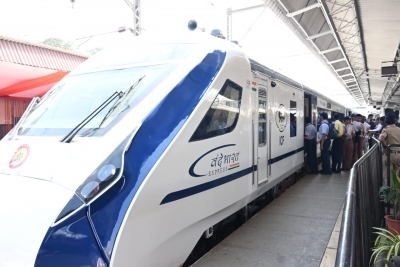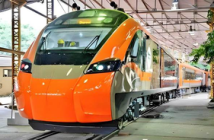By Venkatachari Jagannathan
Chennai, March 2 (IANS) The winning bid to roll out 200 Vande Bharat sleeper version trainsets by the Russian-Indian joint venture/consortium (TMH-RVNL) is positive for the Indian industries, said the father of the trainset.
However, there are several questions that are being asked and remain unanswered.
“The bid (Rs 120 crore per trainset for 200 trainsets Rs 24,000 crore) is aggressive, posing a great challenge so TMH (Transmashholding) will have to depend more on local manufacturing than stipulated, which is positive for Indian industries. European multinational manufacturers will not be able to align with a Russian company due to the war with Ukraine,” Sudhanshu Mani, Retired General Manager of Integral Coach Factory and the father of Vande Bharat train, told IANS.
On Wednesday Rail Vikas Nigam Limited (RVNL) in a regulatory filing had said it has emerged as the Lowest Bidder (L1) for “Manufacturing cum Maintenance of Vande Bharat Trainsets including Up-gradation of the Government Manufacturing Units & Trainset Depots” in JV with (1) Joint Stock Company Metrowagonmash-70 per cent (2) Joint Stock Company Locomotive Electronic System-5 per cent and (3) ARail Vikas Nigam Limited-25 per cent.
“As per financial opening dated 01.03.2023, the M/s. JSC Metrowagonmash-Mytischi-RVNL (JV) has been declared L-1. The total quantity is 200 Trainsets and cost per set is Rs 120 crore,” RVNL said.
While the cost of production of 200 trainsets will be about Rs 24,000, the maintenance operations will fetch the joint venture over Rs 30,000 crore spread over several years.
The major question that arises is why RVNL was content with 25 per cent stake and not 26 per cent. With 26 per cent voting rights a joint venture partner’s consent is needed to pass any special resolution by a company.
“The emergence of Russia’s Tranmashholding as the lowest financial bidder for 200 Vande Bharat trains and the consortium of BHEL and Titagarh Wagons as the second lowest bidder presents a challenge for the timely production of the Vande Bharat trains,” Mani had earlier said.
“Although the quoted rates appear to be very aggressive, it may be so due to TMH’s desperate quest to enter the Indian market through the order for 120 trains at Latur. They have no footprint in India and it will not be an easy task for them to deliver these trains in time,” he added.
“It would also be interesting to see if BHEL Titagarh accepts this L1 price for 80 trains in ICF. It surely is a dampener for competent manufacturers like Alstom, Siemens and Stadler and some uncertainty for this ambitious project,” Mani said.
It will be interesting to note whether the JV will use the Vande Bharat design (developed by ICF) or the Russian design and badge the train as Vande Bharat.
“With the kind of rates they have quoted, in most probability they will use the ICF developed design,” an industry expert told IANS.
Meanwhile, the share prices of RVNL have gone up on Thursday.
The RVNL stock opened at Rs 61.90 after closing at Rs.58.52 on Wednesday. The share then hit a high of Rs 66.50 and low of Rs 61.90 and is changing hands in the Rs 66 band.
Attempts to reach out to top RVNL officials by IANS for comments went in vain.
(Venkatachari Jagannathan can be reached at v.jagannathan@ians.in)
–IANS
vj/dpb





